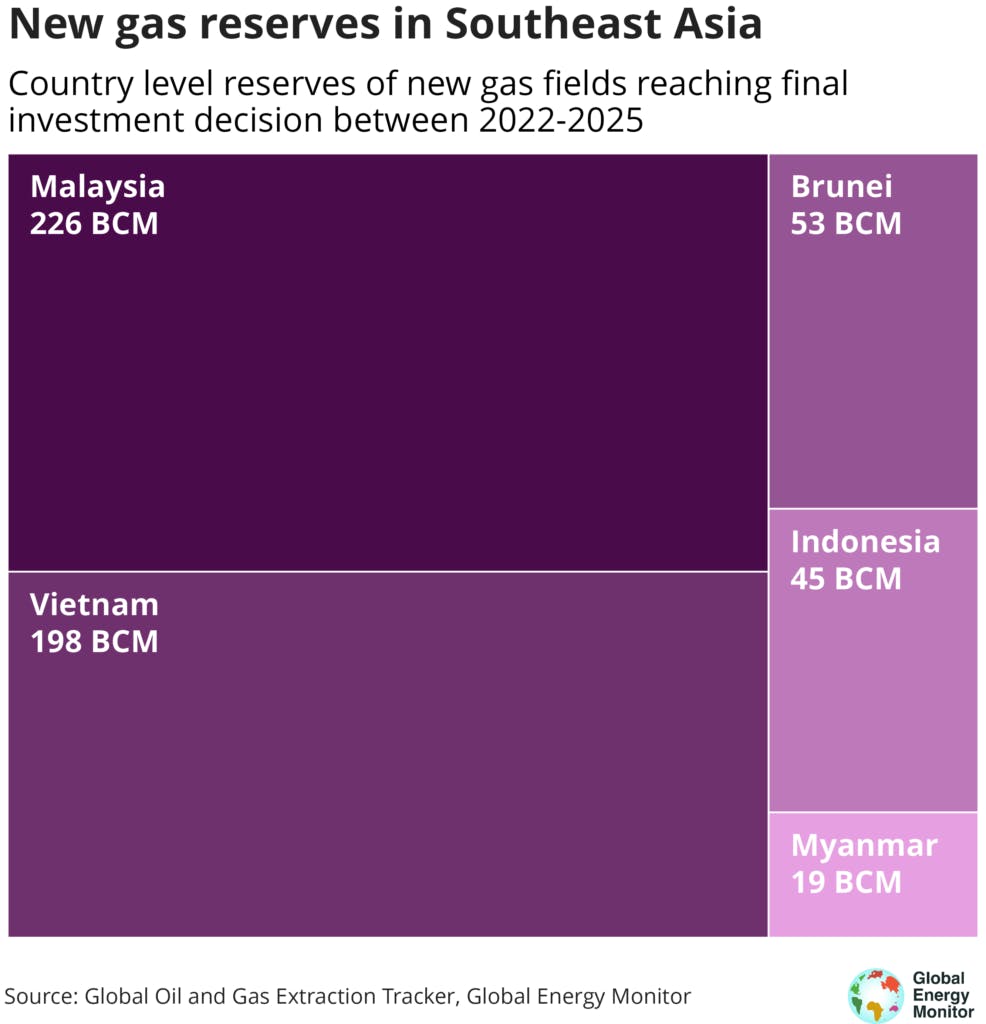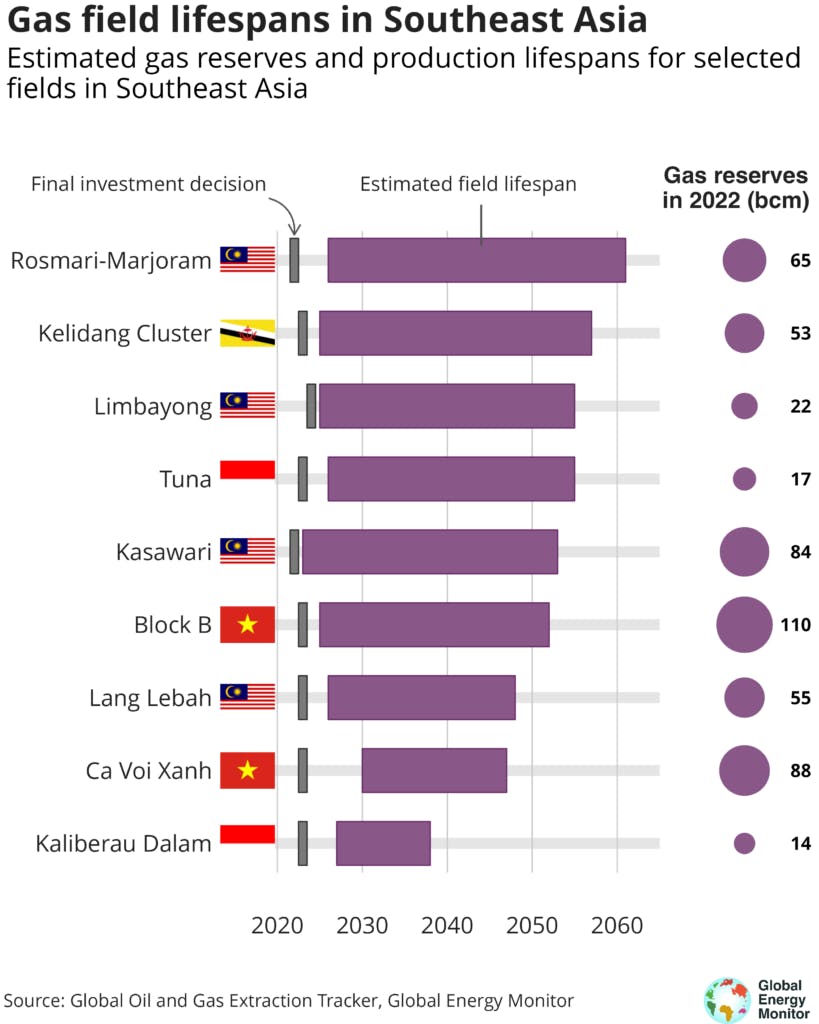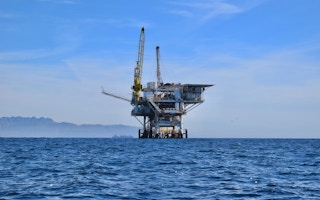The planned expansion of gas production in Southeast Asia, especially in Malaysia and Vietnam, puts the world at risk of breaching the climate-critical 1.5-degree Celsius global warming limit, according to a new report.
At least 19 new gas fields across Malaysia, Vietnam, Indonesia and Brunei are expected to reach their final investment decisions by 2025, said Global Energy Monitor, a non-governmental organisation that catalogues fossil fuel and renewable energy projects worldwide, citing their Global Oil and Gas Extraction Tracker.
These fields have estimated reserves of over 540 billion cubic metres of gas, which equate to about 15 per cent of the region’s total proven gas reserves in 2020, said Global Energy Monitor. Over 75 per cent of the fields are located in Malaysia and Vietnam and are “in development”, which means the fields have moved from the “discovered” phase and are now sanctioned for development.
“Not only would the proposed new gas exploration run afoul of scientific consensus that no new oil and gas fields can be developed while keeping global heating below 1.5 degrees Celsius, but the potential lifespans of some proposed fields extend beyond the net-zero timeframe set by many of these countries,” the organisation said in its report.

Malaysia and Vietnam account for more than 75 per cent of in-development gas fields, according to data from the Global Oil and Gas Extraction Tracker. Image: Global Energy Monitor
In addition to the 19 newly sanctioned gas fields, the report also highlights significant fields being planned across other Southeast Asian countries, although they have not received final investment decisions. This includes the Abadi field and Gendalo-Gehem reserves in Indonesia and seven gas fields in the Philippines.
The planned new gas fields contradict warnings from the International Energy Agency (IEA) and global scientific consensus that there must be no new oil and gas projects if a net-zero emissions pathway is to be achieved by 2050. Global Energy Monitor pointed out that the International Institute for Sustainable Development found in a 2022 report that “not only is there no need for new fields, but most importantly there is no room for new fields to be developed if we are to limit warming to 1.5-degrees Celsius.”
“Energy demand is increasing across Southeast Asia as economies grow, but ramping up gas production is not a long-term solution,” said Scott Zimmerman, project manager for the Global Energy Monitor’s Global Oil and Gas Extraction Tracker.
Instead, higher energy demand should be met via cost-effective, renewable energy sources, which is not only a lower-carbon alternative but would also insulate the region from volatile gas prices, said Zimmerman.
Both Malaysia and Vietnam, however, recently said that they will continue to rely on gas to meet domestic energy needs despite having committed to achieving net-zero emissions by 2050. Vietnam’s new National Energy Masterplan, published on 26 July, suggested that the country will turn to domestic gas for power generation. Meanwhile, the Malaysian government recently positioned gas as a “stabilising factor” in the country’s energy transition as it increases its share of renewable energy.

Several planned gas reserves in Southeast Asia have production lifespans that extend far beyond the targeted net-zero timeframes of their host countries. Image: Global Energy Monitor
Greenwashing risks
In Malaysia, which is Southeast Asia’s top gas producer, several of the newly sanctioned gas reserves fall under the purview of oil and gas giants Shell and Petronas, both of which recently had advertising campaigns banned in the United Kingdom over greenwashing. Petronas, which is Malaysia’s national oil company, was also flagged by a local environmental watchdog for greenwashing after the group announced that it had made six new oil and gas discoveries off the coast of Sarawak state.
“Part of Petronas’s Net Zero Carbon Emissions by 2050 aspiration (NZCE) is to expand the extraction and production of gas. This is in blatant opposition to the International Panel on Climate Change (IPCC), which has warned that even current fossil fuel infrastructure is incompatible with a 1.5-degree target,” said the Malaysian non-profit group Rimbawatch in a statement.
The group went on to point out that Petronas’ NZCE, which has been publicised to the press, and associated marketing materials are “exemplary of what the United Nations High-level Expert Group have defined as greenwashing.” This includes claiming to have a net-zero strategy while also continuing to build or invest in new fossil fuel supply, as well as “tackling only part of their emissions rather than the full value chain.”
Petronas’ NCZE 2050 applies only to Scope 1 and 2 emissions, which are associated only with the extraction and processing of fossil fuels, and not Scope 3, which covers emissions from the use of Petronas’ products. Rimbawatch estimates that Petronas’ Scope 3 emissions amount to 307 million tonnes of carbon dioxide and its equivalents (CO2e), compared to 47.9 million tonnes of CO2e for its combined Scope 1 and 2 emissions.
“The fact that Scope 3 accounts for the majority of Petronas’s total emissions and that Petronas’s NZCE 2050 aspiration does not include plans to reduce Scope 3 emissions, are not communicated clearly by Petronas in their net-zero marketing materials,” said Rimbawatch.
Eco-Business reached out to Petronas with questions on how their upstream expansion plans align with the group’s net-zero aspirations, but had yet to receive answers at the time of writing. However, at a recent climate finance summit in Kuala Lumpur, Petronas’ chief finance officer Liza Mustapha responded to audience questions on greenwashing by saying that the oil company is “very forthcoming when we say we will still be producing oil and gas, but that we want to do it in a responsible manner.”
“(If we were) greenwashing, we would probably have put all that aside and just talked about other facets of the organisation,” she said. In discussing what constitutes greenwashing, Liza pointed to how clean energy solutions company Gentari was established and is wholly-owned by Petronas. “Is that greenwashing? You could take greenwashing to the n-th degree, but I think the main thing for us is to make sure we do [decarbonise] in the right manner.”
Petronas is not the only oil and gas company to come under scrutiny for its climate targets. At Shell’s annual general meeting in May, climate activist shareholder group Follow This filed a resolution calling for tougher emissions reduction targets by 2030. Earlier this year, Shell’s board of directors were personally sued in the United Kingdom for what plaintiffs argued was a “fundamentally flawed” transition strategy.
Petronas’ Liza acknowledged that the world faces a climate emergency, but that as an energy company, the national oil firm cannot ignore the needs of rural or underprivileged communities. “Energy security cannot be taken off the table simply because we need to deal with climate first,” she said.

















